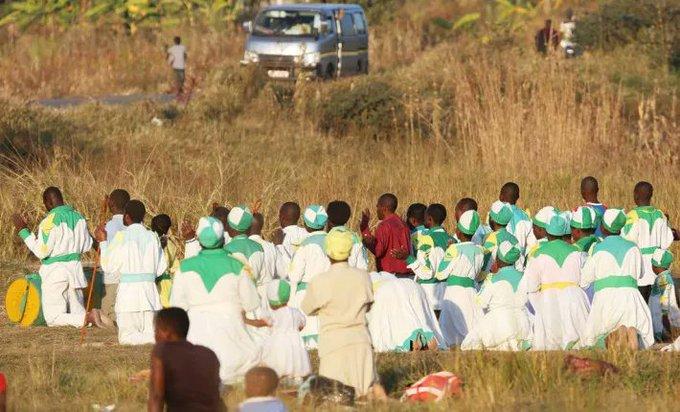News / National
BCC targets 'freaky' items used by apostolic churches in proposed ban
06 Jun 2024 at 16:28hrs |
0 Views

The Bulawayo City Council (BCC) is advocating for a ban on the use of flags, tents, clothes, banners, and scary artefacts by apostolic churches, stating that these practices are against the local culture of Bulawayo residents.
This proposal is part of the recommendations made by the local authority following a study on the prevalence of open-air worship in the city.
The local authority has been at odds with apostolic sect churches, accusing them of violating city by-laws. Last month, the Mthwakazi Republic Party (MRP) conducted raids on apostolic sect shrines around the city, claiming they were cleansing the environment of activities they deemed alien to Matabeleland culture and tradition.
According to the latest council minutes, the BCC conducted a two-month-long study in April and May to understand the nature and extent of open space worship in Bulawayo, the impact of open space worship on the environment, and potential strategies to address the issue.
The findings revealed that these religious groups were disregarding existing laws such as the Protection of Lands By-Laws, the Regional Town and Country Planning Act, and the EMA Act, among others.
"It was recommended that apostolic churches desist from mounting flags, tents, clothes, banners, and scary artefacts such as knives in the environment, as this is against the local culture of Bulawayo residents. These items should be removed forthwith to maintain social harmony," the report stated.
The report further recommended prohibiting the planting of alien trees without council authority and the removal of such trees to prevent their invasion into the city.
It also called for the removal of all rituals and related paraphernalia from council land, with perpetrators to be fined under the relevant council environmental by-laws.
Additionally, the report recommended that the Lands Inspectorate subsection conduct educational awareness campaigns to enlighten apostolic churches and residents on council land management legislation and environmental management by-laws.
The BCC and the Environmental Management Agency are urged to impose stipulated fines on apostolic churches found making ritual fires, as these contribute to wild fires, and land degradation, and pose threats to property and lives.
This proposal is part of the recommendations made by the local authority following a study on the prevalence of open-air worship in the city.
The local authority has been at odds with apostolic sect churches, accusing them of violating city by-laws. Last month, the Mthwakazi Republic Party (MRP) conducted raids on apostolic sect shrines around the city, claiming they were cleansing the environment of activities they deemed alien to Matabeleland culture and tradition.
According to the latest council minutes, the BCC conducted a two-month-long study in April and May to understand the nature and extent of open space worship in Bulawayo, the impact of open space worship on the environment, and potential strategies to address the issue.
The findings revealed that these religious groups were disregarding existing laws such as the Protection of Lands By-Laws, the Regional Town and Country Planning Act, and the EMA Act, among others.
The report further recommended prohibiting the planting of alien trees without council authority and the removal of such trees to prevent their invasion into the city.
It also called for the removal of all rituals and related paraphernalia from council land, with perpetrators to be fined under the relevant council environmental by-laws.
Additionally, the report recommended that the Lands Inspectorate subsection conduct educational awareness campaigns to enlighten apostolic churches and residents on council land management legislation and environmental management by-laws.
The BCC and the Environmental Management Agency are urged to impose stipulated fines on apostolic churches found making ritual fires, as these contribute to wild fires, and land degradation, and pose threats to property and lives.
Source - cite.org.zw
Join the discussion
Loading comments…









































